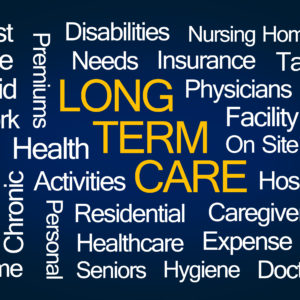
At a workshop I gave a few weeks ago, a very polished woman came up to me. She told me that she and her husband had purchased long-term care insurance policies many years ago and had been recently notified that the premiums were going up. This wasn’t a small increase: her premiums were doubling and her husband’s were tripling.
“We were smart,” she said. “We did the responsible thing and bought long-term care insurance. But now we can’t afford to keep it and we don’t know what to do.”
She was clearly upset. “You need to tell people about this,” she urged me. “People need to know.”
This woman isn’t alone. More and more people are finding themselves in the same situation, including some of my clients. Long-term care insurance is getting more expensive. Fewer companies are offering it. Those that do charge exorbitant premiums.
Without long-term care insurance, how can people plan for costs associated with care in an assisted living facility or a nursing home? Other than having a trust fund or being independently wealthy, which most people aren’t, how can the average person pay for care that could run as much as $100,000 per year?
Fortunately, there are a few options. One is a hybrid life insurance/long-term care policy. A hybrid policy typically features a life insurance component with a long-term care rider. Hybrid policies generally have a single upfront premium but may also have a set of premiums for a fixed term or ongoing fixed premium payments.
What people like about the hybrid option is that the policy provides a life insurance policy, long-term care insurance, and guaranteed return of premiums. Some hybrid policies also return a percentage of premiums paid if you cancel the policy before the end of the surrender charge period. In other hybrid policies, if you don’t end up needing long-term care, your beneficiaries will get a death benefit when you die.
You still have to qualify medically for hybrid policies, which means that people with certain medical conditions won’t be eligible. But my financial planner colleagues tell me that it’s easier to qualify medically for a hybrid policy than it is for a regular life insurance policy.
If you’ve never had long-term care insurance or you had a policy that has lapsed, either because you can’t afford the premiums or you no longer qualify medically, it’s important to make other provisions to pay for care. What can you do? Pre-Crisis Medicaid Planning is one option. This is especially important if you’ve recently been diagnosed with a chronic illness that will result in the eventual deterioration of your health. If we start your planning early enough, you have all kinds of options. We could do some irrevocable trust planning. We can protect assets so we can be sure you can get Medicaid benefits quickly if you need them. This could involve changing your estate plan from a Will-based or Revocable Trust-based estate plan to an Irrevocable trust-based plan and making sure that your Power of Attorney is worded in the right way.
Though no one wants to lose long-term care insurance, especially if you’ve been paying premiums for years, the good news is that you do have options. If you want to evaluate yours, the Flammia Elder Law Firm would be happy to help. Just give us a call.


